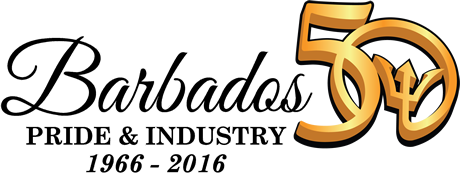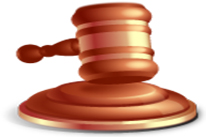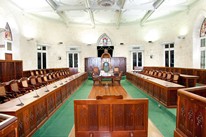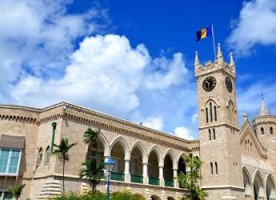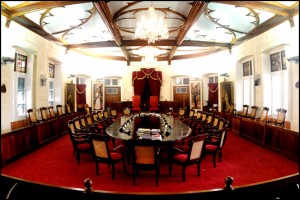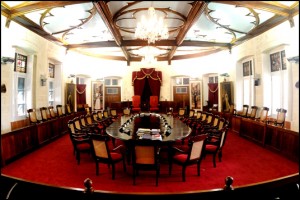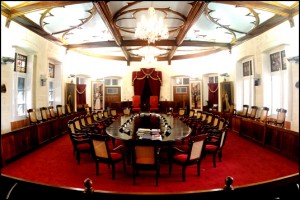The History
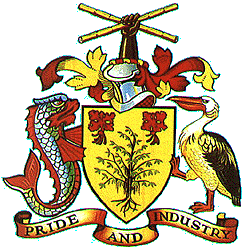
In 1625, the captain and crew of an English trading ship landed at Holetown (originally named James Town) and claimed possession of Barbados on behalf of James I, King of England (James VI of Scotland).
Barbados was colonised in 1627 in the name of Charles I (1625-49) by the Governor, Charles Wolferstone, as the representative of the Earl of Carlisle, after whom Carlisle Bay was named. The Governor appointed a Council comprising the main landowners to assist him in the government of the island. The island remained a British Colony until Independence was attained in 1966. However, Barbados was never grant-aided in any way during its colonial period. Barbados has always funded its own budget fully.
In 1629, Barbados was divided into six parishes. These were: Christ Church, Saint Michael, Saint James, Saint Thomas, Saint Peter and Saint Lucy.
Sixteen land-owners were chosen in 1639 to constitute the House of Burgesses, soon to become the House of Assembly. Candidates for the House of Burgesses were required to be property owners until the Representation of the People (Amendment) Act of 1950 gave to all persons aged 21 and over the right to vote without any income or property qualification and to contest elections also without any income or property qualification. The income and property qualifications were progressively lowered until the last modification in 1943.
Barbados was divided into the present 11 parishes in 1645. Each parish thereafter chose two representatives for the House of Assembly.
Col. Thomas Modyford was elected in 1652 as the first Speaker of the House of Assembly. Thereafter, the two Houses of Parliament, the Legislative Council and the House of Assembly, sat separately. Eventually the meetings of the Council were held for several years at the official residence of the Governor.
In 1813, John Brathwaite, Esquire, was elected by the Legislative Council as its first President.
In 1831, free coloured men who satisfied the property requirements became entitled to vote in elections for the House of Assembly. An Act was passed by which coloured men became eligible for election of the House of Assembly. In 1843, Samuel Jackman Prescod, the first coloured man to sit in the House, was one of two members elected to the House of Assembly for the new constituency of the City of Bridgetown. Thereafter, there were 24 members of the House of Assembly until 1981.
Sir Conrad Reeves, (member of the House of Assembly 1874-86 and Chief Justice of Barbados thereafter to 1902), the first black Knight, was among the first appointees to Executive Committee in 1881.
In 1884, the income qualification for the right to vote was fixed at £50 sterling ($240), a quite considerable sum at that time.
In 1885, an Act was passed "to require that all votes upon the taking of a poll at any election of Members to serve in the General Assembly, or in the several vestries of this island shall be given by ballot." Each parish elected a vestry annually to deal with local government matters affecting that parish.
In 1924, the Democratic League of Barbados, a pioneering black political group, was founded by Dr. Charles Duncan Oâ??Neal, its first President, who was also Founder and Patron of the Barbados Working Menâ??s Association. Dr. Oâ??Neal represented the City of Bridgetown in the House of Assembly during 1932-36.
The Barbados Progressive League, soon to become the Barbados Labour Party, was formed in April and launched in October 1938.
The House of Assembly was, from 1938, elected for two years.
In 1944, the income qualification for voters was reduced to sterling £20 from £50 where it had been set in 1884. Women acquired the right to vote and to become members of either House of Parliament but needed the same qualifications as men.
In the general election in November 1946, the Barbados Labour Party led by Sir Grantley Adams, won 9 seats, the West Indian National Congress Party led by Mr. Wynter A. Crawford 7, the Barbados Electors Association led by Mr. Jack H. Wilkinson 6, and 2 Independents were elected. The Bushe Experiment by which elected Members were given quasi-ministerial portfolios was introduced after this election.
The House of Assembly was, from 1948, elected for 3 years.
After the 1948 general election, Sir Kenmore Nathaniel Rhystone "Doc" Husbands, member for Saint Peter, became the first black man to be elected as Speaker of the House of Assembly.
In 1948, Mrs. Muriel Hanschell was appointed to the Legislative Council, the first woman member of either House.
The general election in December 1951, was the first under adult suffrage. Dame Edna Ermyntrude Bourne, D.A., was the first woman to be elected as a member of the House of Assembly. She represented St. Andrew until 1961.
Ministerial government commenced on February 1, 1954. Sir Grantley Adams was the first Premier. The other Ministers were:
- Hon. Dr. H. Gordon H. Cummins (member 1935-36; 1940-61)
- Hon. Mencea E. Cox (later Sir Mencea, member 1944-61; Senator 1976-81)
- Hon. Ronald G. Mapp (later Sir Ronald, member 1946-61; Senator 1976-79)
- Hon. C. Edwy Talma (later Sir Edwy, member 1944-48; 1961-76)
Mr. Fred C. Goddard (member 1948-1966 and Senator 1971-76) became the first Leader of the Opposition.
The Democratic Labour Party was formed in 1955.
The House of Assembly was, from 1956, elected for five years. The 1951-54 House was extended during its tenure to five years.
In 1956, the Barbados Labour Party was returned to office in a general election with 15 seats. The Democratic Labour Party won 4 seats and the Conservatives 4 seats. Sir Frank Walcott (member 1945-66 and 1971-76; Senator 1966-71; President 1986-92) was elected as an Independent Member. In August, the precincts of the House of Assembly were defined.
The year 1958 was a very busy year for Barbados. The Federation of The West Indies was formed with Sir Grantley Adams as Prime Minister. Dr. H. G. H. Cummins became the second Premier of Barbados in succession of Sir Grantley Adams. Cabinet Government began in Barbados. An Act was passed to make better provision for local Government in the island. It divided Barbados into (1) the City of Bridgetown with councillors elected for the separate wards or areas comprising (a) the City Ward (b) the Saint Michael Ward and (c) the Carlisle Ward, the City of Bridgetown becoming a corporation with a Mayor, Deputy Mayor, Aldermen (senior councillors) and Councillors, (2) the Northern District Council with a Chairman, Aldermen and Councillors and (3) the Southern District Council, with the same structure as in the North. Mr. Ernest D. Mottley (member 1946-71) was the first Mayor for the City of Bridgetown.
Barbados attained full internal self-government in 1961. In December, the Democratic Labour Party won the general election securing 14 seats. The Barbados Labour Party and the Barbados National Party each won 4 seats and 2 Independent members were elected. Rt. Hon. Errol W. Barrow (member 1951-56 and 1958-87) became Premier.
On May 31, 1962 the Federation of The West Indies was dissolved.
In 1964, voting age was reduced to age 18.
The Barbados Independence Act was passed by the United Kingdom Parliament in 1966. On November 18, the designation Premier was changed to Prime Minister by an amendment to the Barbados (Letters Patent Consolidation) Order, 1964. The Barbados Independence Order was laid in the United Kingdom Parliament on November 22. Sir John Stow, the last Governor, held office as Governor-General until May, 1967 and then retired from the Colonial (now Foreign and Commonwealth) Service. The Duke of Kent opened the Second Session of the Parliament on 1966-71 on Independence Day. Barbados became a Member of the United Nations.
In 1967, Local Government Councils were abolished.
On May 18, Sir Winston Scott, took office as the first native Governor-General, succeeding Sir John Stow.
Sir Grantley Adams (member 1934-58; 1966-70) retired from Parliament in 1970.
In 1971, the system of double member constituencies based on the boundaries of the 11 parishes and of the City of Bridgetown was abolished. Twenty-four single member constituencies were established on the basis of an average electorate per constituency within a permitted percentage variation 90% - 110% by the Representation of the People Act, 1971. In the general election on September 9, the Democratic Labour Party won 18 seats and the Barbados Labour Party 6.
The House of Assembly introduced time limits on speeches in 1973.
In 1976, Sir Winston Scott, Governor-General, died in office. The Barbados Labour Party (BLP) won 17 seats in the general election in that same year. The other 7 seats went to the Democratic Labour Party (DLP). Rt. Hon. John Michael Geoffrey Manningham "Tom" Adams became Prime Minister. Hon. Billie Antoinette Miller was appointed a Minister, the first woman to serve in a Barbados Cabinet and Sir Deighton Ward was sworn in as Governor-General.
In November 1977, the Queen and Prince Philip visited Barbados on the occasion of Her Majesty's Silver Jubilee and the Queen addressed a new Session of Parliament.
In 1980, the Representation of the People (Amendment) Act, increased the maximum number of seats in the House of Assembly from 24 to 27, the first increase since 1843 when Samuel Jackman Prescod was first elected in Bridgetown.
The Barbados Labour Party led by Rt. Hon. J.M.G.M."Tom" Adams won 17 seats in the general election in 1981, the other 10 seats going to the Democratic Labour Party.
A system of National Honours was established in 1980 by warrant of Her Majesty the Queen under the sign manual. The Governor-General is Chancellor of the Order of Barbados.
In 1983, the Senate introduced time limits on Speeches.
Sir Deighton Ward, Governor-General, died in office in January 1984. In February, Sir Hugh Springer was sworn in as Governor-General.
On March 11, 1985 Prime Minister "Tom" Adams died at his official residence, Ilaro Court. Sir Harold St. John, Deputy Prime Minister, took office as Prime Minister on the same day.
On May 28, 1986, the Democratic Labour Party won 24 seats and the Barbados Labour Party 3 seats in the general election. Rt. Hon. Errol W. Barrow became Prime Minister. He died at his home one year later on June 1. One that same day, Rt. Hon. L. Erskine Sandiford was sworn in as Prime Minister.
In February 1989, 4 members of the governing Democratic Labour Party went into opposition, led by Dr. Richard C. Haynes, as the new National Democratic Party replacing the Barbados Labour Party as the official Opposition.
On March 9, 1989, Her Majesty the Queen received Addresses in the Senate Chamber from both Houses on the occasion of the Commemoration of the 350th Anniversary of the establishment of a Parliament for Barbados.
On 26th June, 1989, the 350th anniversary of the first Parliament, a joint session was held in the presence of the Governor-General, Sir Hugh Springer, who was a former member of the House of Assembly (1940-47), of presiding officers from the Commonwealth Caribbean Countries, from Westminster and Ottawa and, on behalf of the US Congress, of faculty from William and Mary College at Harvard University. All former Barbados Parliamentarians were invited to the Ceremony which included the blessing and unveiling of a monument on the Central Bank compound where the legislature is believed to have had its first meeting place.
Dame Nita Barrow succeeded Sir Hugh Springer, who had retired, as Governor-General on June 6, 1990.
Also in 1990, the Electoral and Boundaries Commission in its review of constituency boundaries increased the number of seats in the House of Assembly from 27 to 28.
On January 21, 1991, the Democratic Labour Party, led by Rt. Hon. L. E. Sandiford, won the general election securing 18 seats. The Barbados Labour Party won the other 10 seats.
Parliament was dissolved on June 18, 1994, having lasted for 3 years 4½ months, the shortest Parliament by over one year of any Barbados Parliament since 1951. In the September 5 general election, the Barbados Labour Party, led by Rt. Hon. Owen S. Arthur, won 19 seats, the Democratic Labour Party won 8 and the National Democratic Party captured their first seat in an election. Three women, Hon. Billie Miller, Hon. Elizabeth Thompson and Hon. Mia Mottley were elected in the General Election and became Cabinet Ministers.
In December 1995, Dame Nita Barrow, Governor-General, died in office. Sir Clifford Husbands was sworn in as Governor-General on June 1, 1996.
In 1996, Hon. Sir Henry deB. Forde, Mr. Philip M. Greaves, Rt. Hon. L. Erskine Sandiford, Hon. Sir Harold St. John and Mr. Branford M. Taitt were presented with awards in tribute to their achievement of 25 years of service each in Parliament. Sir Arnott Cato received a special award for his long service in the Parliaments of Barbados and of the Federation of the West Indies.
August 1, 1997 was celebrated as Emancipation Day for the first time.
In April 1998, the Order of National Heroes Act was passed. National Heroes Day was celebrated on April 28, the centenary of the birth of Sir Grantley Adams. The National Heroes, each bearing the title the Right Excellent, are:
- Bussa (Born in Africa. Killed in a battle for freedom in Barbados in 1816)
- Sarah Ann Gill (1795-1866)
- Samuel Jackman Prescod (1806-1871)
- Dr. Charles Duncan Oâ??Neal (1879-1936)
- Clement Osbourne Payne (1904-1941)
- Sir Grantley Herbert Adams (1898-1987)
- Rt. Hon. Errol Walton Barrow (1920-1987)
- Sir Hugh Worrell Springer (1913-1994)
- Sir Frank Leslie Walcott (1916-1999)
- Sir Garfield St. Aubyn Sobers (1936)
On December 26, 1998 Parliament was dissolved
In the January 20, 1999 General Election, the Barbados Labour Party led by Rt. Hon. Owen S. Arthur, won 26 seats and the Democratic Labour Party won 2 seats. The majority of the Barbados Labour Party is the largest secured by any party in an election in Barbados.
Mr. Louis R. Tull completed 25 years of Parliamentary service in 1998 and was presented with a congratulatory award.
On February 16, the 1999-2004 Parliament convened by Proclamation for their first sitting.
The Rt. Hon. David Thompson led the Democratic Labour Party to victory in the General Election held on January 15, 2008, securing 20 seats. The Barbados Labour Party won 10 seats.
On April 28, National Heroes Day, the place known as Trafalgar Square was renamed National Heroes Square.
In August 2000, the Barbados Centennial Honour was established and was presented to 100 Barbadians on January 1, 2001 in an investiture by His Excellency the Governor General at Government House. One awardee, Mr. James Sisnett, B.C.H., a centenarian, strode unaided to be invested with his award.
Sir (then Mr.) David Simmons completed 25 years of continuous Parliamentary service early in 2001 and his service was acknowledged by a complimentary presentation.

